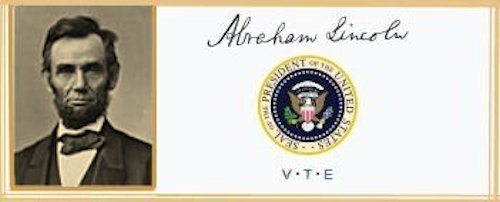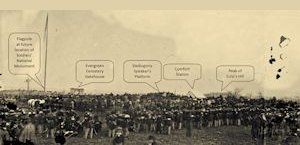
The Gettysburg Address, 1863
Wisconsin Soldiers at Gettysburg--Coming Soon!
Return to Veteran's Library Index

The Gettysburg Address in Lincoln's Handwriting--Page: [ 1 ] [ 2 ] [ 3-4 ]
The Hay copy with Lincoln's handwritten corrections
|
Each of the five known manuscript copies of the Gettysburg Address is named for the person who received it from Lincoln. Lincoln gave copies to his private secretaries, John Nicolay and John Hay. Both of these drafts were written around the time of his November 19 address, while the other three copies of the address, the Everett, Bancroft, and Bliss copies, were written by Lincoln for charitable purposes well after November In part because Lincoln provided a title and signed and dated the Bliss copy, it has become the standard text of Lincoln's Gettysburg Address. |
||
The Standard Text of President Lincoln's Gettysburg Address
|
Usage of "under God"
The words "under God" do not appear in the Nicolay and Hay drafts but are included in the three later copies (Everett, Bancroft, and Bliss). Skeptics maintain Lincoln did not utter the words "under God" at Gettysburg. However, reporters who telegraphed the text of Lincoln's speech on that very day included "under God" in their transcript.. Historian William E. Barton noted, "the words, 'the nation shall, under God, have a new birth of freedom.' There was no common source from which all the reporters could have obtained those words but from Lincoln's own lips at the time of delivery."
Ronald C. White wrote: "It was an uncharacteristically spontaneous revision for a speaker who did not trust extemporaneous speech. Lincoln had added impromptu words in several earlier speeches, but always offered a subsequent apology for the change. In this instance, he did not. And Lincoln included "under God" in all three copies of the address he prepared at later dates. 'Under God' pointed backward and forward: back to "this nation", which drew its breath from both political and religious sources, but also forward to a "new birth". Lincoln had come to see the Civil War as a ritual of purification. The old Union had to die. The old man had to die. Death became a transition to a new Union and a new humanity." |
The Gettysburg
Address is a speech that U.S. President Abraham Lincoln delivered
during the American Civil War at the dedication of the Soldiers' National
Cemetery, now known as Gettysburg National Cemetery, in Gettysburg, Pennsylvania
on the afternoon of November 19, 1863, four and a half months after the Union
armies defeated Confederate forces in the Battle of Gettysburg, the Civil War's
deadliest battle. It remains one of the best known speeches in American history.
Lincoln's carefully crafted but brief address, which was not even scheduled as
the day's primary speech, came to be seen as one of the greatest and most
influential statements on the American national purpose. In just 271 words,
beginning with the now famous phrase "Four score and seven years ago,"
referring to the signing of the Declaration of Independence 87 years earlier,[6]
Lincoln described the U.S. as a nation "conceived in Liberty, and dedicated to
the proposition that all men are created equal," and represented the Civil War
as a test that would determine whether such a nation could endure. Lincoln
extolled the sacrifices of those who died at Gettysburg in defense of those
principles, and then urged that the nation ensure:
that these dead shall not have died in vain—that this nation, under God, shall
have a new birth of freedom—and that government of the people, by the people,
for the people, shall not perish from the earth
Despite the prominent place of the speech in the history and popular culture of
the United States, its exact wording is disputed. The five known manuscripts of
the Gettysburg Address in Lincoln's hand differ in a number of details, and also
differ from contemporary newspaper reprints of the speech. Nor is it precisely
clear where, on the grounds of the Gettysburg cemetery, Lincoln delivered the
address. Modern scholarship locates the speakers' platform at least 120 feet
(36.58 m) away from the traditional site in Soldiers' National Cemetery at the
Soldiers' National Monument, such that it stood entirely within the private,
adjacent Evergreen Cemetery. A 2022 interpretation of photographs of the day,
using 3D modeling software, has argued for a slightly different
location—straddling the current fence around Evergreen Cemetery.
|
One of only two confirmed photos of Lincoln (center, facing camera) Taken about noon on November 19, 1863; at Gettysburg. Lincoln spoke some three hours later. To Lincoln's right is Ward Hill Lamon, his bodyguard |
|
 |
An analysis of this scene, looking NE on 19 Nov 1863, was done
by Alexander Gardner,
*Click on the photo to enlarge it |
.
Background
The written invitation of David Wills, who led the establishment of
Soldiers' National Cemetery, inviting Lincoln to speak at Gettysburg
Union soldiers dead at Gettysburg, photographed by Timothy H. O'Sullivan,
July 5–6, 1863
Following the Battle of Gettysburg on July 1–3, 1863, the removal of the
fallen Union soldiers from the Gettysburg Battlefield graves and their
reburial in graves at the National Cemetery at Gettysburg began on October
17, though on the day of the ceremony, interment was less than half
complete.
In inviting President Lincoln to the ceremonies, David Wills, of the
committee for the November 19 Consecration of the National Cemetery at
Gettysburg, wrote, "It is the desire that, after the Oration, you, as Chief
Executive of the nation, formally set apart these grounds to their sacred
use by a few appropriate remarks."
On the train trip from Washington, D.C. to Gettysburg on November 18,
Lincoln was accompanied by three members of his Cabinet, William Seward,
John Usher, and Montgomery Blair, several foreign officials, his secretary
John Nicolay, and his assistant secretary, John Hay. During the trip,
Lincoln remarked to Hay that he felt weak; on the morning of November 19,
Lincoln mentioned to Nicolay that he was dizzy. Hay noted during the speech
that Lincoln's face had "a ghastly color" and that he was "sad, mournful,
almost haggard". After the speech, when Lincoln boarded the 6:30pm train to
return to Washington, D.C., he was feverish and weak with a severe headache.
A protracted illness followed, which included a vesicular rash; it was
diagnosed as a mild case of smallpox. It is highly likely that Lincoln had
the early symptoms of smallpox as he delivered the Gettysburg Address.
After arriving in Gettysburg, which had become filled with large crowds,
Lincoln spent the night in Wills's house. A large crowd appeared at the
house, singing and wanting Lincoln to make a speech. Lincoln met the crowd,
but did not have a speech prepared, and returned inside after saying a few
extemporaneous words. The crowd then continued to another house, where
Secretary of State William Seward delivered a speech. Later that night,
Lincoln wrote and briefly met with Seward before going to bed at about
midnight. Wikipedia
Bliss' Copy of
President Lincoln's Gettysburg Address
Ever since Lincoln wrote it in 1864, this version has been the most often
reproduced, notably on the walls of the Lincoln Memorial in Washington. It
is named after Colonel Alexander Bliss, stepson of historian George
Bancroft. Bancroft asked President Lincoln for a copy to use as a fundraiser
for soldiers. However, because Lincoln wrote on both sides of the paper, the
speech could not be reprinted, so Lincoln made another copy at Bliss's
request. It is the last known copy written by Lincoln and the only
one signed and dated by him. Today it is on display at the Lincoln Room of
the White House.
Four score and seven years ago our fathers brought forth on this continent,
a new nation, conceived in Liberty, and dedicated to the proposition that
all men are created equal.
Now we are engaged in a great civil war, testing whether that nation, or any
nation so conceived and so dedicated, can long endure. We are met on a great
battle-field of that war. We have come to dedicate a portion of that field,
as a final resting place for those who here gave their lives that that
nation might live. It is altogether fitting and proper that we should do
this.
But, in a larger sense, we can not dedicate -- we can not consecrate -- we
can not hallow -- this ground. The brave men, living and dead, who struggled
here, have consecrated it, far above our poor power to add or detract. The
world will little note, nor long remember what we say here, but it can never
forget what they did here. It is for us the living, rather, to be dedicated
here to the unfinished work which they who fought here have thus far so
nobly advanced. It is rather for us to be here dedicated to the great task
remaining before us -- that from these honored dead we take increased
devotion to that cause for which they gave the last full measure of devotion
-- that we here highly resolve that these dead shall not have died in vain
-- that this nation, under God, shall have a new birth of freedom -- and
that government of the people, by the people, for the people, shall not
perish from the earth.
Abraham Lincoln
November 19, 1863
|
© Every submission is protected by the Digital Millennium Copyright Act of 1998.
Show your appreciation of this freely provided information by not copying it to any other site without our permission.
Become a Clark County History Buff
|
|
A site created and
maintained by the Clark County History Buffs
Webmasters: Leon Konieczny, Tanya Paschke, Janet & Stan Schwarze, James W. Sternitzky,
|